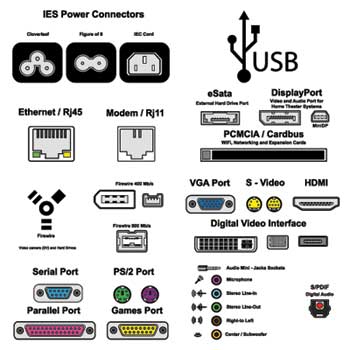
- Computer Fundamentals
- Computer - Home
- Computer - Overview
- Computer - Applications
- Computer - Generations
- Computer - Types
- Computer - Components
- Computer - CPU
- Computer - Input Devices
- Computer - Output Devices
- Computer - Memory
- Computer - RAM
- Computer - Read Only Memory
- Computer - Motherboard
- Computer - Memory Units
- Computer - Ports
- Computer - Hardware
- Computer - Software
- Computer - Number System
- Computer - Number Conversion
- Computer - Data and Information
- Computer - Networking
- Computer - Operating System
- Computer - Internet and Intranet
- Computer - How to Buy?
- Computer - Available Courses
- Computer Useful Resources
- Computer - Quick Guide
- Computer - Useful Resources
Computer - Ports
A port is a physical docking point using which an external device can be connected to the computer. It can also be programmatic docking point through which information flows from a program to the computer or over the Internet.
Characteristics of Ports
A port has the following characteristics −
External devices are connected to a computer using cables and ports.
Ports are slots on the motherboard into which a cable of external device is plugged in.
Examples of external devices attached via ports are the mouse, keyboard, monitor, microphone, speakers, etc.

Let us now discuss a few important types of ports −
Serial Port
Used for external modems and older computer mouse
Two versions: 9 pin, 25 pin model
Data travels at 115 kilobits per second
Parallel Port
Used for scanners and printers
Also called printer port
25 pin model
IEEE 1284-compliant Centronics port
PS/2 Port
Used for old computer keyboard and mouse
Also called mouse port
Most of the old computers provide two PS/2 port, each for the mouse and keyboard
IEEE 1284-compliant Centronics port
Universal Serial Bus (or USB) Port
It can connect all kinds of external USB devices such as external hard disk, printer, scanner, mouse, keyboard, etc.
It was introduced in 1997.
Most of the computers provide two USB ports as minimum.
Data travels at 12 megabits per seconds.
USB compliant devices can get power from a USB port.
VGA Port
Connects monitor to a computer's video card.
It has 15 holes.
Similar to the serial port connector. However, serial port connector has pins, VGA port has holes.
Power Connector
Three-pronged plug.
Connects to the computer's power cable that plugs into a power bar or wall socket.
Firewire Port
Transfers large amount of data at very fast speed.
Connects camcorders and video equipment to the computer.
Data travels at 400 to 800 megabits per seconds.
Invented by Apple.
It has three variants: 4-Pin FireWire 400 connector, 6-Pin FireWire 400 connector, and 9-Pin FireWire 800 connector.
Modem Port
- Connects a PC's modem to the telephone network.
Ethernet Port
Connects to a network and high speed Internet.
Connects the network cable to a computer.
This port resides on an Ethernet Card.
Data travels at 10 megabits to 1000 megabits per seconds depending upon the network bandwidth.
Game Port
Connect a joystick to a PC
Now replaced by USB
Digital Video Interface, DVI port
Connects Flat panel LCD monitor to the computer's high-end video graphic cards.
Very popular among video card manufacturers.
Sockets
Sockets connect the microphone and speakers to the sound card of the computer.